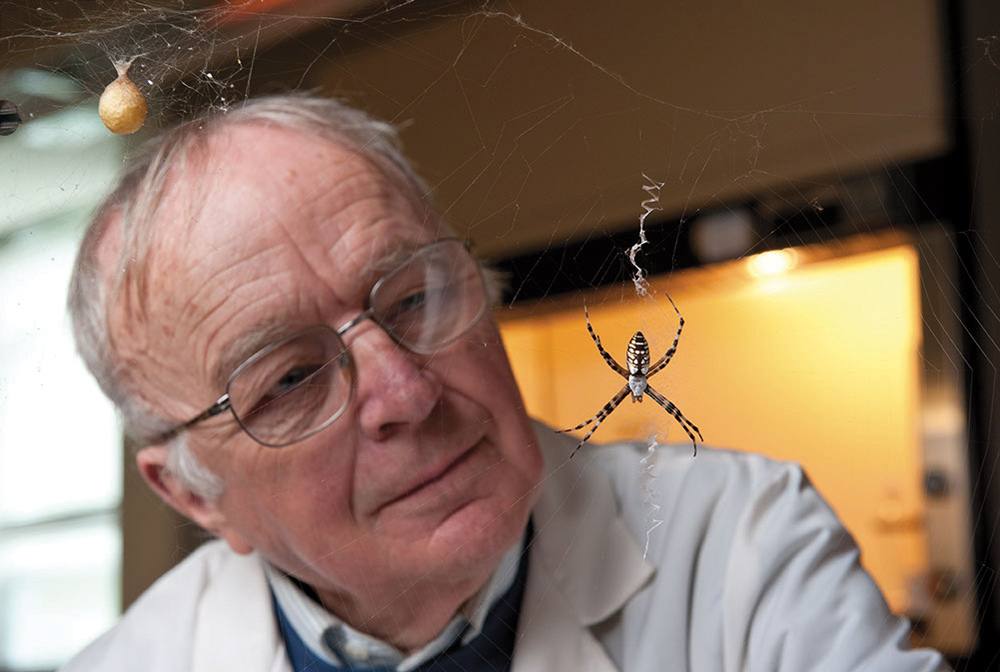Bright Shall Thy Mem’ry Be: In Memoriam

Edward Tillinghast
A UNH professor of zoology, Tillinghast was known for eclectic interests that included earthworms and chicken blood. The great joy of his academic life, however, was studying spiders. Black widows, brown recluses, tarantulas and barn spiders intrigued him, but his special interest was the black and yellow garden spider.
He spotted his first garden spider at age 8 while living on a Rhode Island farm, one of many stops in a difficult childhood that found him bouncing among foster homes following the breakup of his biological family. As a teenager, a serendipitous invitation to live with a minister and his family sparked his interest in higher education. After earning an undergraduate degree in zoology from URI and a Ph.D. in physiology from Duke University, he joined the UNH faculty in 1967. He researched spider venom, webs, digestive fluids, and mating habits, becoming a well-known arachnologist in the field of spider silk chemistry and the glue that spiders extrude to trap their victims.
His enthusiasm for spiders was contagious, says Marcus (Mark) Townley, ’84 ’93G. As an undergraduate work-study student, he became so intrigued with Tillinghast’s spider discoveries that he stayed at UNH to continue researching and publishing with him while earning his own doctorate.
The two men often conducted lab research on Saturdays and discussed their progress over a restaurant lunch. “At more than one of these meals, after expressing an idea, he would say, ‘Marcus, argue with me,’ if he thought my view might differ from his, but always with a great humanity that was encouraging, not confrontational,” says Townley. Years later, he realized that the lunches were one of Tillinghast’s many kindnesses. Aware that graduate students often struggle financially, he would insist on paying for them both, saying, “Marcus, I invited you here to talk about such-and-such. I’ve got this.” It was, says Townley, his professor’s way of extending charity without making it seem like a handout.
Spider hunting trips were a constant in Tillinghast’s life, often accompanied by his intrepid wife, Margaret, visiting arachnologists and graduate students. Townley especially remembers searching for barn spiders. Rural barn owners initially suspicious of strangers asking permission to sweep their barns for spiders were so charmed by Tillinghast’s explanations they often invited the group to return. Subsequent visits would find newly fascinated owners waiting for them with unswept barns so the group could collect as many specimens as possible.
Tillinghast also enjoyed painting and sculpture and understood the importance of the humanities as part of a well-rounded education. Other interests centered on experimenting with food. He never hesitated to try new dishes, says his son Joel, including devouring meals of squirrel stew and snake.
Charles Walker, emeritus professor of zoology and Tillinghast’s close friend for decades, recalls visiting many restaurants with him. Walker’s favorite memory is the time he invited his friend over for a home-cooked meal of Forty Garlic Chicken. Tillinghast loved it, he says, but when he returned home wreathed in a pungent cloud of garlic, “Margaret made him sleep on the couch.”
Busy as he was with research, mentoring, teaching, and other interests, Tillinghast was always there for his family. In addition to Valerie and Joel, he and Margaret were the parents of sons Eli ’89, Dan ’89, and Ben, and daughters Sharon and Naomi, who predeceased him. Mindful of his own troubled childhood, he emphasized family life and traveled extensively with Margaret and their children throughout much of the U.S and Canada.
Speaking at his father’s funeral, Joel shared the aspects of his character that he most admired: “His curiosity, imagination, open mind and kindness.” He taught his children by example, especially when it came to compassion and tolerance, says Joel, recalling a long-ago day when, as a show of support for the Civil Rights Movement, the two deliberately sat in the Black section of a segregated lunch counter in the South. Ignoring glares from the waitress, they calmly ate their lunch. There was no reason not to sit there, his father later explained, because “people are people.”
Tillinghast died on December 8, 2021, shortly after celebrating 64 years of marriage with his beloved Margaret. Nearing the end of his life, he recalled a halcyon day of gathering spiders with his wife in a sunny field in Georgia.
“This,” he said, “is love.”